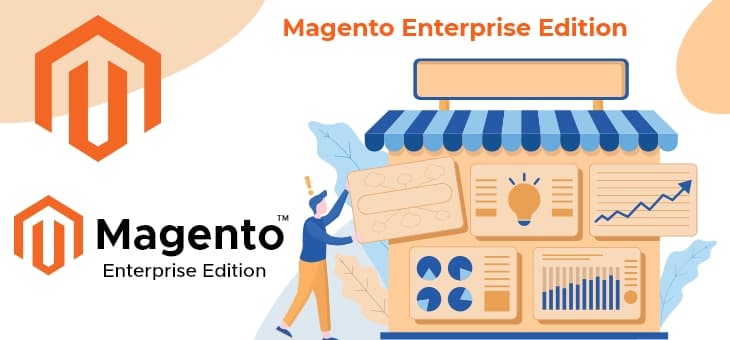E-commerce continues to provide beneficial facilities for people to purchase quickly and smoothly through eCommerce stores. More and more eCommerce websites are increasing day by day.
The first step to developing any eCommerce website is to choose the best suitable platform for eCommerce store development. Among all the eCommerce platforms present, Magento is the best platform for developing an eCommerce store.
Presently there are three versions of Magento: Magento Community Edition, Magento Enterprise Edition, and Magento Commerce Edition.
Once you choose the Magento platform for developing an eCommerce app, you must select a version of Magento.
What is Magento Community Edition?

Magento Community Edition is mainly a free platform that can easily be used to develop an eCommerce store. Therefore, it mostly attracts small businesses or startups because it doesn’t need any investment.
This version of Magento meets all the basic requirements of a small eCommerce store. You can even add various functionalities and install Magento extensions to make your store unique and user-friendly. In addition, it doesn’t need any large configurations that make it friendly for new learners.
Magento 2 Community Edition is the most-liked and known version for people because whenever you ask them about What it is Magento? They will give answers that represent the Community edition.
The community edition of Magento is supported by a large community of third-party applications and web developers. You won’t need to pay any money to use this Community edition; you will need to pay for the Magento development if you hire any to customize your eCommerce store.
Who Needs the Magento Community Edition?
One of the main benefits of choosing the Community edition is it is free of charge. That makes Magento 2 Community Edition a strong choice when money is a significant issue. Money is worth considering when you are a small company or startup and don’t need many specifications and customization.
Magento Community Edition is mainly famous for web developers who are developing sites en masse. This Edition enables developers to develop various websites for different customers without paying multiple Magento license fees. Because of this reason, the Community edition has a lot to offer to the eCommerce store owner who has a budget for it.
What is Magento Enterprise Edition?

Magento Enterprise Edition is a paid version; it is not free like Community Edition. But you don’t need to worry about Magento 2 enterprise edition costs. Magento eCommerce cost is among the most competitive in the market. Magento Enterprise Edition cost is much higher than Magento Community Edition, and it is worth being costly because of the advanced features that it consists of.
Magento Enterprise Edition consists of high security, better performance, and upgraded scalability. In addition, it has many features that are beneficial for your eCommerce website.
Who Needs the Magento Enterprise Edition?
Magento 2 Enterprise Edition is specially designed for enterprise customers. First, you check some of the top Magento websites. Each Magento Enterprise Edition is targeted at large companies looking forward to expanding an eCommerce store on a large scale.
One of the best ways to choose between Magento Enterprise Edition vs Magento Community Edition is to ask yourself how essential your eCommerce website is. If it is just a necessity but not an important tool, you can go for Magento Community Edition. However, on the other hand, if your eCommerce website is critical and has essential tools, you need to go for Magento 2 Enterprise Edition.
What is Magento Commerce Cloud Edition?

Magento Commerce Cloud Edition is one of the unique names among Platform As A Service (PAAS) for providing the best eCommerce efficiency. Paas and Saas are both different models of cloud services. While it later provides service to customers with limitations in server-level composition, the former allows users to go through the source code and develop the software through the tools provided by Paas companies.
Magento Commerce Cloud will run on AWS Amazon Web Services infrastructure, the most used and common cloud solution. That includes the best-in-class technologies. One doesn’t need to worry about Magento Commerce Cloud cost as it is not that much. In addition, AWS can help improve the development, monitoring, security, and content delivery of your store. Currently, Adobe also added Microsoft Azure as Infrastructure as a service Iaas for Magento Commerce Cloud.
Who Needs the Magento Commerce Cloud Edition?
Magento Commerce Cloud Edition is used for developing a cloud-hosted eCommerce store that is achieving a lot of popularity due to the high scalability of a cloud-hosted platform. There are a lot of cloud-based hosting providers available in the market.
Here are some primary reasons to select Magento Commerce Cloud Edition:
- AWS managed hosting and autoscaling
- Magento Commerce has out-of-the-box features
- Simple support and maintenance
- Additional services
- Multiple environment support
Side-by-side feature comparison of CE, EE, and Commerce Cloud
Community Edition (CE):
Open-Source:
Magento CE is designed in such a way that developers can modify it anytime as per the requirements of the business and he has full control over access to the platform.
Free to Use:
Magento is a boon for small businesses as they can utilize resources fully because it is free to download and use. They can begin their business as it is budget-friendly.
Basic E-Commerce Capabilities:
While it comes equipped with all the essential features needed to run an online store, its functions are relatively basic, especially when compared with the more premium versions. It’s suitable for businesses that do not require advanced technical capabilities.
Limited Support:
One of the significant downsides is the lack of official customer support. Users are mostly dependent on forums and community support for troubleshooting and assistance, which might not be ideal for resolving urgent issues quickly.
Fewer Features:
CE has fewer out-of-the-box features and functionalities compared to EE and Commerce Cloud. For extensive customization or advanced performance features, businesses may need to consider third-party solutions or upgrades, which can be limiting based on the skills available in-house.
Enterprise Edition (EE):
Premium Version:
Magento EE is a premium offering that requires the purchase of a license. This investment guarantees access to a full range of superior features and official support services not available in the CE.
Advanced Features:
Designed for medium to large businesses, EE includes sophisticated capabilities like customer segmentation, loyalty programs, and targeted promotions that help companies enhance their marketing strategies and customer engagement.
Professional Support and Security:
Subscribers benefit from dedicated professional support, including direct help from Magento’s team, and enhanced security features that are essential for safeguarding sensitive data and ensuring a trustworthy shopping experience.
Scalability:
EE is equipped to handle larger traffic volumes, with advanced performance capabilities and options for scalability, ensuring the platform can grow seamlessly with your business without compromising speed or user experience.
Magento Commerce Cloud:
Cloud Hosting:
Magento Commerce Cloud includes reliable cloud hosting, potentially offering superior performance due to the distribution of resources and offloading of server maintenance, leading to fewer concerns about infrastructure management for businesses.
Integrated Advanced Features:
It harbors the advanced features found in EE, with additional cloud-specific benefits like Git integration and staging environments, allowing for smoother development workflows and easier testing before deployment.
Automatic Updates:
Commerce Cloud users receive automatic patches and updates, ensuring the platform is always running the latest version. This feature is crucial for maintaining security standards and introducing new features with minimal effort from the site owners.
Designed for Larger Businesses:
With its robust, scalable solutions, Magento Commerce Cloud is tailored for larger enterprises wanting comprehensive e-commerce solutions. Its enhanced functionalities and managed infrastructure services alleviate the operational strain, allowing businesses to focus more on growth and strategy.
CE:
- Adequate for businesses with lower traffic.
- Performance can be impacted under heavy loads unless optimized externally.
- Requires manual setup for higher-performance infrastructure.
EE:
- High performance under increased loads; better caching and indexing.
- Improved page load speeds and response times due to optimizations.
- More robust data handling capabilities.
Commerce Cloud:
- Potentially superior performance due to cloud infrastructure.
- Easier scalability during high-traffic periods.
- Performance insights and reporting tools are available.
How Magento Ensures Your ECommerce Website Safety
Security Features and Support Services Comparison
CE:
- Basic security features; additional security needs to be managed by the user.
- Community support, with the option for paid solutions from third parties.
EE:
- Advanced security features include Secure Payment Bridge, stronger data encryption, and security patches.
- Dedicated technical support from the Magento team.
Commerce Cloud:
- Enhanced security through cloud infrastructure.
- Automated backups, and dedicated security measures specific to cloud-hosted environments.
- Dedicated 24/7 support services are included.
Cost-effectiveness Analysis in the short and long-term
CE:
- Highly cost-effective initially for small businesses due to its free nature.
- Potential increase in costs long-term due to the need for external plugins, security features, and scalability solutions.
EE:
- Higher initial investment due to licensing fees.
- Cost-effective in the long run for growing and large businesses due to built-in features reducing the need for additional investments.
Commerce Cloud:
- Regular subscription fees inclusive of hosting and a certain level of support.
- Predictable cost model beneficial for long-term budgeting.
- Potentially more cost-efficient for large enterprises needing the stability, security, and scalability of cloud hosting.
Considerations for Making Your Choice
Assessing Your Business Needs and Future Growth Plans:
Understanding your current position and where you want your business to go is crucial in selecting the right Magento edition. Consider the size of your product catalog, anticipated traffic, and future expansion plans. For small businesses with limited resources, starting with the Community Edition might be feasible. However, growing enterprises with ambitious scaling plans might find the robust features of the Enterprise Edition or the Commerce Cloud more aligned with their strategic developments, accommodating rapid growth and higher customer volumes without compromising performance.
Best Magento Development Solutions for Small Businesses
Technical Considerations – Scalability, Customisability, and Integrations:
Evaluate the technical proficiency of your team and the specific functionalities your e-commerce store requires. The Community Edition, while being cost-effective, requires more hands-on management and might be limiting in terms of scalability and advanced features. In contrast, the Enterprise Edition and Commerce Cloud offer superior customisability, scalability, and seamless integrations with other systems (CRM, ERP, etc.), essential for businesses looking to provide a sophisticated, feature-rich shopping experience. These advanced versions also support larger, more complex businesses with extensive technical demands.
Budgetary Constraints and Expected ROI:
Budget plays a significant role in your choice. The Community Edition is a go-to for those with limited funds, providing basic e-commerce capabilities with no upfront costs. However, for businesses prioritizing long-term ROI, investing in the Enterprise Edition or Commerce Cloud may be more prudent. These versions require a larger initial investment but offer comprehensive features, security, and support, potentially leading to higher sales conversions, customer retention, and ultimately, a better return on investment. Consider not just the initial cost, but also the potential for growth and revenue generation when assessing budget constraints and ROI.
Support, Maintenance, and Community Assistance
Community Edition (CE):
- Support: Primarily through community forums and free resources online. No official technical support is offered by Magento for CE users.
- Maintenance: Users often rely on themselves or third-party services for site maintenance, including updates, security patches, and bug fixes.
- Community Assistance: A vast, active community that contributes to forums and online resources, assisting with troubleshooting and extensions.
Enterprise Edition (EE):
- Support: Subscribers receive direct, comprehensive support from the Magento team, which includes technical assistance and dedicated account management.
- Maintenance: Regular updates, security enhancements, and bug fixes are directly provided by Magento, simplifying maintenance efforts.
- Community Assistance: Besides official support, EE users still benefit from community-generated resources and guidance, though with less reliance.
Guide for Hiring a Magento Maintenance Partner
Magento Commerce Cloud:
- Support: Full-service support is included in the subscription, offering 24/7 technical assistance from Magento experts, and proactive performance monitoring.
- Maintenance: Automated updates, security features, and patches are integrated into the platform, reducing the manual maintenance workload.
- Community Assistance: Access to both a professional support team and the shared wisdom of the community, providing a well-rounded support system.
Real-world Scenarios and Case Studies
Community Edition (CE):
Small e-commerce start-ups and entrepreneurs often leverage CE. For example, a local boutique store expanding its online presence would use CE for its no-cost, basic e-commerce capabilities. They would rely on community support for troubleshooting and gradually enhance their site with plugins.
Enterprise Edition (EE):
Medium to large e-commerce sites requiring robust functionalities find EE suitable. A well-known fashion brand, for instance, could utilize EE’s advanced features to manage higher online traffic, create personalized customer experiences, and handle complex product catalogs, all backed by official Magento support.
Magento Commerce Cloud:
Large enterprises needing high scalability and performance opt for Commerce Cloud. An international electronics retailer might choose this for seamless management of high-traffic loads, especially during sales or product launches. The cloud infrastructure offers reliability during traffic surges, and the comprehensive support ensures quick resolution of technical issues.
Top eCommerce Trends That Will Shape 2023 and Future
Conclusion
Suppose you are willing to develop an eCommerce app for the first time and are confused about which Magento version to choose for creating your eCommerce website. In that case, this blog will guide you in the right way to select the best performance for your Magento eCommerce store.
This blog will give you detailed knowledge of each version and who needs that particular version so you can choose wisely among all three versions.
You can hire Magento eCommerce developer from Nevina Infotech to develop your eCommerce store as we are the best Magento development company. Hope this blog will help you to solve your confusion and provide a solution.
FAQs
What is the difference between Community Edition, Enterprise Edition, and Magento Commerce Cloud?
Magento is a popular open-source e-commerce platform that allows users to create and manage online stores. However, there are different versions of Magento that cater to different business needs. Here are the main differences between Community Edition, Enterprise Edition, and Magento Commerce Cloud.
> Community Edition is the free, open-source version of Magento that can be downloaded and installed on your own server.
> Enterprise Edition is the premium version of Magento that is designed for larger businesses with more complex needs.
> Magento Commerce Cloud is a cloud-based version of Magento that offers hosting, support, and additional features.
What are the features of Community Edition?
Community Edition is a free, open-source version of Magento that offers basic e-commerce features. Here are the main features of Community Edition.
> Product management
> Order management
> Customer management
> Marketing and promotion tools
> Shipping and payment options
Community Edition is suitable for small businesses that need a basic e-commerce platform without the added features and support of Enterprise Edition or Magento Commerce Cloud.
What are the features of Magento Commerce Cloud?
Magento Commerce Cloud is a cloud-based version of Magento that offers hosting, support, and additional features. Here are the main features of Magento Commerce Cloud.
> Cloud hosting and infrastructure
> Automatic scaling and performance optimization
> Advanced security and compliance
> Access to Magento experts and support
> Integration with other Adobe products
Read Also:-
- How To Choose A Magento Application Development Company
- Why New Businesses Are Preferring Magento 2 For Their ECommerce Platform?
- How Much Is Magento Compatible With PWA?
- Why Choose Magento To Build An Omnichannel Retail Portal
- Features Of Magento Community, Magento Enterprise
- Smart Ideas To Boost Your Magento Store Sales



